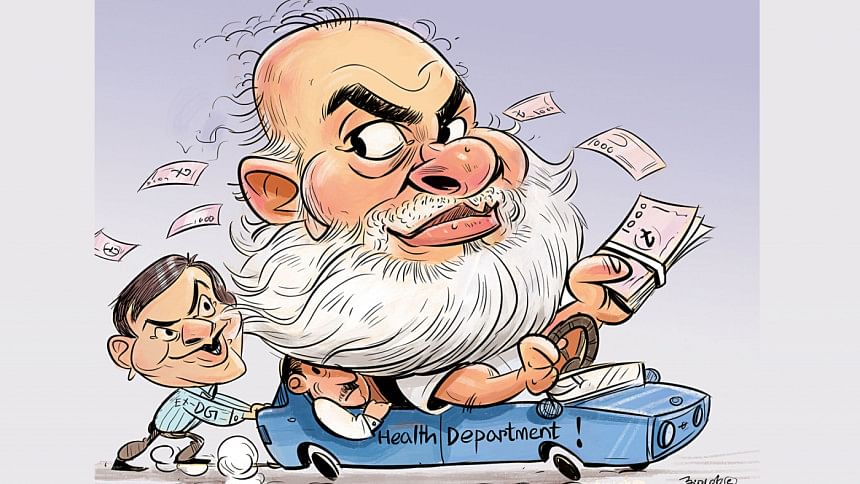The elusive zero tolerance for corruption

How many times have we heard government officials and ruling party members mention that this government has a zero-tolerance policy for corruption? The answer is many, of course—that was a rhetorical question. Then why is it that corruption seems to be skyrocketing? That's the real question.
By now, the story of Abdul Malek, a driver of the Directorate General of Health Services (DGHS), has travelled far and wide. Known to his neighbours as "Mr Badal", a rich businessman in the Bamnartek area where he lived, Malek is an alleged puppet master who influenced the promotion and transfer of hundreds of DGHS employees, and somehow managed to secure jobs for his daughter, son-in-law, brother and nephew at the health directorate.
According to Lt Col Ashique Billah, director of Rab's legal and media wing, Malek possessed more than Tk 100 crore in wealth and is the owner of two seven-storied buildings in Dakkhin Kamarpara of Turag. Apart from these, Malek also owns several plots in different parts of the capital, where land value, as we know, is astronomically high.
But how did a driver at a government office become so powerful? Could he have done all this on his own, or did he have associates and enablers? And most importantly, who was pulling his strings?
Between 2009 and 2010, Malek allegedly had a hand in the appointment of more than 100 health assistants. According to a top official quoted by Prothom Alo, Malek was also the "collector" of former Director General of Health Services, Shah Munir Hossain, who denied the allegation as well as any knowledge of Malek's misdeeds. He, however, wasn't the only top official in the DGHS that Malek had an "intimate relationship" with. According to reports, Malek also drove around and had a close relationship with the current Director General of the Health Services Division who, to no one's surprise, also denied having any knowledge of his crimes. Was Malek that good at hiding his misdeeds? Of course not. Numerous DGHS officials have come forward and shared information about his influence and criminality with the media since his arrest. It seems the Director Generals of the Health Services Division, who also were his direct bosses, were the only ones in the dark!
No wonder then that the DGHS has become a cesspool of corruption, most of which has only come to light after the disastrously handled coronavirus outbreak. Only on September 21, this paper reported that an accountant of the DGHS, Abzal Hossain, and his wife Rubina Khanam had laundered about Tk 40 crore abroad. (Too bad for Malek he was only a driver, who was not sophisticated enough to launder his wealth abroad).
But it was more than 19 months ago that the Anti-Corruption Commission (ACC) sent a report to the health ministry identifying sources of graft in the health sector, which set alarm bells ringing. One of its findings was that corruption takes place during the purchase of medicines, surgical equipment and other machines due to absence of proper monitoring by the government. According to the report, a nexus of contractors and officials from different organisations under the ministry buys many "inessential machines and equipment to misappropriate money." In the same report, submitted in January 2019, the ACC gave 25 recommendations on preventing graft and other corrupt practices. All those recommendations, however, appear to have fallen on deaf ears as allegations of corruption in the procurement of N95 masks, PPE units and other safety gear surfaced even after the Covid-19 pandemic hit Bangladesh around March.
Moreover, on December 12 last year, the ACC handed a letter to the health ministry asking it to blacklist 14 medical equipment providers, who were found involved in misappropriation of public money worth about Tk 108 crore in several graft cases. Ironically, it took the DGHS over six months to blacklist them. Only God knows how much money was misappropriated in those six months—because by the looks of things, we certainly won't.
Just like the health ministry ignored the ACC recommendations (some for six months and others till now), in 2014, a Transparency International Bangladesh (TIB) survey similarly revealed information on bribery in recruitment, transfer, posting and promotion in the health sector. Unsurprisingly, the authorities (in what has almost become an unbreakable and sacred tradition) denied it. Had the TIB survey been taken into account, it is possible that the corruption now infesting the health sector could have been avoided, and Malek might have been apprehended a long time ago.
So why is it that the authorities continue to "see no evil, hear no evil and speak no evil"? One possibility is, when a driver of a government office can accumulate such enormous wealth, it does not take a rocket scientist to figure out how much money the real big fish are making. And as the saying goes, "birds of a feather flock together". The other likely possibility is that the authorities have begun to swallow their own propaganda when it comes to all the zero-tolerance-for-corruption rhetorical nonsense. Because that's what it is—as the record of corruption from a whole host of different government organisations illustrates.
Of course, it doesn't have to be either/or. It is possible that both are correct. After all, the human psyche is quite fragile. And once someone (or some group) becomes so corrupt, it is likely that he/she would start deluding themselves to believe otherwise. In that case, swallowing one's own propaganda might just be the soma pill (from Huxley's Brave New World) that one needs.
Eresh Omar Jamal is a member of the editorial team at The Daily Star.
His Twitter handle is: @EreshOmarJamal

 For all latest news, follow The Daily Star's Google News channel.
For all latest news, follow The Daily Star's Google News channel. 



Comments